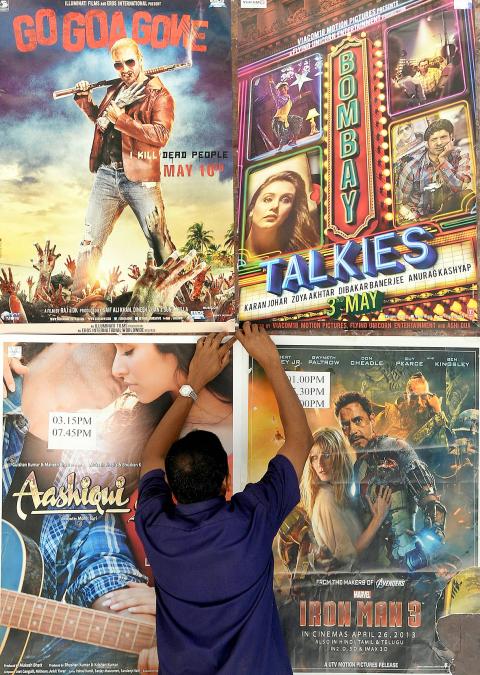India’s movie industry toasted its 100th birthday last Friday with the release of two films celebrating its humble origins in the silent era and the influence of glamorous modern-day Bollywood.
Bombay Talkies comprises four short stories inspired by India’s love of cinema and the impact of the movies, created by some of the country’s leading filmmakers.
“You usually celebrate birthdays and that’s what we are doing today. Indian cinema turns 100 and we are acknowledging that,” said Zoya Akhtar, who directed the film along with Karan Johar, Anurag Kashyap and Dibakar Banerjee.

Photo: AFP
The acclaimed cast includes Nawazuddin Siddiqui and Rani Mukherjee, with a cameo from acting legend Amitabh Bachchan.
The film’s theme song features Bollywood A-listers that include Aamir Khan, Shah Rukh Khan, Vidya Balan, Priyanka Chopra and Kareena Kapoor.
The movie will have a special gala screening at the Cannes film festival this month, where India is to be honored as the “guest country” in its landmark year.
“The four short stories are about passion for cinema and ingredients like drama, music, dance and entertainment. All of these ingredients are a huge part of our films and culture,” said co-producer Ashi Dua.
Its release comes 100 years to the day since the opening in Bombay (now Mumbai) of Raja (King) Harishchandra, the first all-Indian feature film, based on the tale of a virtuous king from the Hindu epic Mahabharata.
It marked the birth of one of the world’s most vibrant film industries, which produced almost 1,500 movies last year in various corners and languages of the country, with Hindi-language Bollywood leading the way.
While Bombay Talkies explores life in the present, the second film opening on Friday is the award-winning Celluloid Man, which pays tribute to the founder of the National Film Archive of India, PK Nair.
The documentary, so far only shown at festivals, showcases Nair’s lifetime dedication to preserving films that date back to the silent era, and it is peppered with clips from historic black-and-white productions.
Thanks to the efforts of 80-year-old Nair, nine silent films out of 1,700 made in India have been preserved, although no records remain of many others.
“Almost 70 percent of the films made before 1950 are lost, including some real gems like the first ‘talkie,’” Nair told AFP, referring to the first Indian film with sound, 1931’s Alam Ara (The Light of the World).
Also on Friday, Indian president Pranab Mukherjee will join stars and filmmakers at the annual National Film Awards in capital New Delhi, following a six-day festival showcasing the colorful history of Indian cinema.
Award-winners, already announced, include Paan Singh Tomar, a Hindi film starring Irrfan Khan about the Indian soldier and athlete who became a notorious bandit.

Wooden houses wedged between concrete, crumbling brick facades with roofs gaping to the sky, and tiled art deco buildings down narrow alleyways: Taichung Central District’s (中區) aging architecture reveals both the allure and reality of the old downtown. From Indigenous settlement to capital under Qing Dynasty rule through to Japanese colonization, Taichung’s Central District holds a long and layered history. The bygone beauty of its streets once earned it the nickname “Little Kyoto.” Since the late eighties, however, the shifting of economic and government centers westward signaled a gradual decline in the area’s evolving fortunes. With the regeneration of the once

Even by the standards of Ukraine’s International Legion, which comprises volunteers from over 55 countries, Han has an unusual backstory. Born in Taichung, he grew up in Costa Rica — then one of Taiwan’s diplomatic allies — where a relative worked for the embassy. After attending an American international high school in San Jose, Costa Rica’s capital, Han — who prefers to use only his given name for OPSEC (operations security) reasons — moved to the US in his teens. He attended Penn State University before returning to Taiwan to work in the semiconductor industry in Kaohsiung, where he

On May 2, Chinese Nationalist Party (KMT) Chairman Eric Chu (朱立倫), at a meeting in support of Taipei city councilors at party headquarters, compared President William Lai (賴清德) to Hitler. Chu claimed that unlike any other democracy worldwide in history, no other leader was rooting out opposing parties like Lai and the Democratic Progressive Party (DPP). That his statements are wildly inaccurate was not the point. It was a rallying cry, not a history lesson. This was intentional to provoke the international diplomatic community into a response, which was promptly provided. Both the German and Israeli offices issued statements on Facebook

Perched on Thailand’s border with Myanmar, Arunothai is a dusty crossroads town, a nowheresville that could be the setting of some Southeast Asian spaghetti Western. Its main street is the final, dead-end section of the two-lane highway from Chiang Mai, Thailand’s second largest city 120kms south, and the heart of the kingdom’s mountainous north. At the town boundary, a Chinese-style arch capped with dragons also bears Thai script declaring fealty to Bangkok’s royal family: “Long live the King!” Further on, Chinese lanterns line the main street, and on the hillsides, courtyard homes sit among warrens of narrow, winding alleyways and